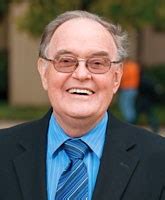A Quote by Lance Morrow
The Church became both more accessible and less imposing. It threw itself open to risk.
Related Quotes
I will not die an unlived life. I will not live in fear of falling or catching fire. I choose to inhabit my days, to allow my living to open me, to make me less afraid, more accessible; to loosen my heart until it becomes a wing, a torch, a promise. I choose to risk my significance, to live so that which came to me as seed goes to the next as blossom, and that which came to me as blossom, goes on as fruit.
In the beginning the church was a fellowship of men and women centering on the living Christ. Then the church moved to Greece where it became a philosophy. Then it moved to Rome where it became an institution. Next, it moved to Europe, where it became a culture. And, finally, it moved to America where it became an enterprise.
It is true that going out on to the street implies the risk of accidents happening, as they would to any ordinary man or woman. But if the church stays wrapped up in itself, it will age. And if I had to choose between a wounded church that goes out on to the streets and a sick, withdrawn church, I would definitely choose the first one.
I think titles are tricky because they're like a really short ad for the book. And like an ad, they should open the door in a way that might be more accessible than the book itself. So I always like titles to be familiar. I'm not trying to break ground with the title itself. The title should feel like something already celebrated.
Probably after Vietnam and Watergate, there was an increasing distrust of institutions, so that Jesus was still in, but the institutional church was no longer an attraction. So, I think that the dropping of the denominational label is to become more generic, less of a threat, less of a reminder of negative stereotypes if you've walked away from church.
What if not just women, but both men and women, worked smart, more flexible schedules? What if the workplace itself was more fluid than the rigid and narrow ladder to success of the ideal worker? And what if both men and women became responsible for raising children and managing the home, sharing work, love, and play? Could everyone then live whole lives?





































